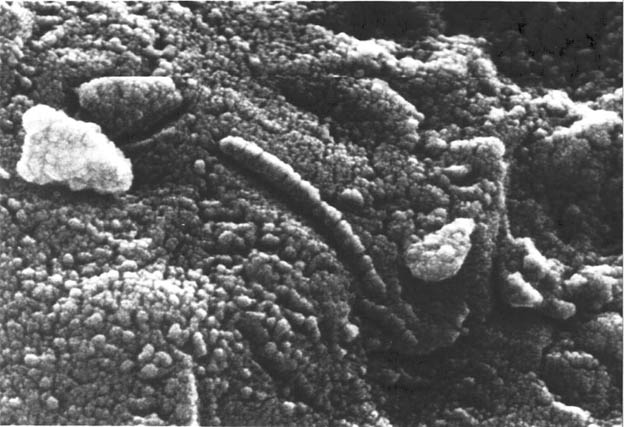The truth is out there: Astrobiology program goes WAY off campus in search of answers

An electron micrograph of a Martian meteorite, showing structures that some scientists think could be fossilized bacteria-like life forms.
Are we alone? Are other planets inhabitable? Are they already inhabited?
These are some of the questions students entering Canada’s first astrobiology graduate program will try to answer.
The new specialization is a collaborative program that will allow students from biology, chemistry, biochemistry, physics, astronomy and earth sciences to specialize in what has quickly become a very popular area of science.
Astrobiology is the study of the origins and future of life in the universe. It includes the search for evidence of life on other planets in our Solar System and beyond.
“It’s a terribly exciting, emerging young science,” says Ralph Pudritz, director of McMaster’s Origins Institute. “These are some of the biggest questions in science, and they always have been, but we’re finally starting to answer some of them.”
Students in the program will take courses on everything from molecular evolution and pre-biotic chemistry to biophysics and planetary astronomy.
“The appeal of this program is that you get deeply trained in something, and then you apply your knowledge to something much broader. It has to be collaborative – no one department could put this together alone,” Pudritz says.
The field of astrobiology has grown tremendously since 1995, when scientists first discovered an extrasolar planet. Since then, nearly 1,000 such planets have been identified.
“It turns out that the answer to the age-old question, ‘Are there other worlds beyond our Solar System?’ is a profound ‘Yes’,” says Pudritz. “So we can now ask if those planets are in habitable zones, and if so, do they support life?”
Pudritz will join a panel of space researchers to discuss the topic March 24 as part of a “Science Sunday” Google Hangout. The livestreamed chat, broadcast on social network Google Plus, will run from 2 to 3 p.m.
Pudritz will be joined by McMaster biologist Jon Stone and astrobiology graduate student Alyssa Cobb, as well as CosmoQuest director Pamela Gay and NASA researcher Chris McKay.
The chat will be moderated by Allison Sekuler, McMaster’s associate vice-president and dean of Graduate Studies, who will be assisted by astrobiology student Danielle Simkus.

